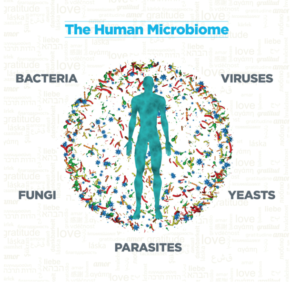 If you’ve heard people discussing gut health, then chances are you’ve probably also heard the buzz word “microbiome.” Here’s what you need to know so that you’re just as street smart and savvy as the young hipsters out there…or anyone else who knows about the microbiome, really.
If you’ve heard people discussing gut health, then chances are you’ve probably also heard the buzz word “microbiome.” Here’s what you need to know so that you’re just as street smart and savvy as the young hipsters out there…or anyone else who knows about the microbiome, really.
Your microbiome refers to the ecosystem of micro-organisms (parasites, bacteria, viruses, fungi, yeast) that reside on our skin, in our gut, in our urine, our nose, and breast tissue.
Feeling a little dirty? Chill. Neither you, nor these organisms are dirty. We all have friendly microbes that help us stay healthy, and harmful ones that make us sick and weak. Even this concept is debatable, as some studies suggest there are in fact no harmful strains of bacteria. It’s only when certain bacteria get out of control and we have an overgrowth, does trouble hit. The key is to keep our different strains in balance so that we stay in tip-top shape. Yes, balance is key!
The microbiota, on the other hand, defines the microbe population in a specific ecosystem or region, such as those populations found in the gut microbiota, skin microbiota or even your ear!
Within the gut, there are approximately 1014 microorganisms (that’s a lot of 0’s). Put another way, we carry roughly up to 2 kg of microbes in our gut alone. Within the tens of trillions of micro-organisms that live there, there are at least 1,000 species of bacteria, consisting of over 3 million genes. Each species of bacteria is required to play a specific role within your body, and each species of microbes has its own genetic code or genome (no, not the sewing machine, that’s Janome, focus people!). These bugs seem to be collectively responsible for the provision of the life-giving nutrients that our bodies need to function properly.
We will dive into genes and how we are triggering genes in ways like never before in other blogs, but let me emphasise the importance here one more time. Not only do we have our own DNA within our cells, but our bacteria that live with us symbiotically, have their own DNA. Collectively, the genetic material of the microbiome (our bugs) is approximately 150 times greater than the human genome, which has led some scientists to label the microbiome as a ‘superorganism’. Some scientists now even think of the microbiome as an organ of the body.
This makes the ratio of host DNA (our DNA) to microbiome DNA about 1:10. Basically our bugs win hands down as far as authority and clout go, and gives greater impetus as to why we need to understand how to harness these bugs for good health. Gut microbiome disturbances affect the health status of the host – that’s you and me, baby.
What does the Microbiome do?
Our gut bacteria are known to:
- Obviously digest our food breaking down certain types of sugars, starches, and fibre from foods so that we can digest them and absorb their nutrients
- Aid the production (not digestion, PRODUCTION FOLKS) of certain vitamins – such as vitamins B (help us handle stress) and K
- Right from the get-go some of the bacteria that first begin to grow inside babies’ intestines are called Bifidobacteria. They digest the healthy sugars in breast milk that are important for growth
- Produce chemicals that improve the health of the cells that form the gut barrier – so they try to protect the gut wall. (Enter the short chain fatty acid Butyrate which we’ll talk about in a minute)
- They regulate aspects of our biology, from the amount of inflammation in the gut (if you’re sore and achy people, think gut health and inflammation) to how efficiently we store extra calories (think weight gain)
- Our gut bacteria aid in the absorption of minerals in other ways too. They degrade minerals complexing with phytate (an “antinutrient” present to varying degrees in all plant-based foods that binds minerals and makes them less absorbable) so they help us maximise our nutrition.
- Gut bacteria can also ferment proteins, producing branched-chain amino acids, well known to be important for muscle recovery and athletic performance.
- They develop and maintain our immune function. So our internal network of bugs help us fight off harmful external bugs and disease processes.
- These bugs also create neurotransmitters for our brain that keep us happy. Bless them!
Okay stay with me now people – stay focused, because here’s where it gets really interesting
The gut microbiota also provides a means for the fermentation of non-digestible substances such as dietary fibres and intestinal mucus. This fermentation is essential for the growth of special microbes that produce short chain fatty acids and other nutrients.
Short-chain fatty acids are produced by the friendly bacteria in your gut and are the main source of nutrition for the cells in your colon.
Due to their anti-inflammatory and anti-cancer properties, it is likely that short-chain fatty acids have a wide range of beneficial effects on your body.
For example studies indicate these short-chain fatty acids (such as acetic acid, propionic acid, and butyric acid may reduce the risk of:
- inflammatory diseases,
- type 2 diabetes,
- obesity,
- heart disease,
- cancer and other conditions.1 , 2, 3, 4
Other studies have shown that short-chain fatty acids also regulate fat metabolism by increasing fat burning and decreasing fat storage5. We like that!
Here’s the cliff notes of why SCFA’s are important:
- extremely beneficial energy sources for the body
- are essential for regulating metabolism
- aid in the absorption of minerals such as calcium, magnesium, copper, zinc, and iron.
- Butyrate is essential for epithelial cells, preventing gut microbiota dysbiosis.
- Acetate is the most abundant SCFA and is an essential metabolite for the growth of other bacteria—reaches the peripheral tissues where it is used in cholesterol metabolism and lipogenesis (the metabolic formation of fat) and plays a role in central appetite regulation.
- Butyrate is also thought to interact with key genes that make cholesterol, possibly reducing cholesterol production6.
This is a call to action for all those with cholesterol problems – check your gut function rather than solely focusing on your heart!
- Propionate is transferred to the liver, where it regulates glucose (gluconeogenesis) and satiety (the feeling of being full, so that we stop eating all day)
Between short chain fatty acids and the other functions of our busy little gut bacteria we can really start to appreciate just how beneficial and important our microbiome truly is. One thing is for certain: looking after your friendly gut bacteria can lead to a whole host of health benefits. Wouldn’t it be wonderful if one day, we could forgo the need for different medications just by eating the foods that our gut needs to keep the balance and order in the body.
. . . . .
 Yours in Health,
Yours in Health,
Jennifer Barham-Floreani
(Bach. Chiropractic, Bach. App Clinical Science
Registered internationally, no longer practicing as a chiropractor in Australia.)
. . . . .
For further information please see:
Good Parenting Starts In The Gut
Why Is Everyone Banging On About Gut Health?
Is Your Gut Making You Feel Unhealthy Paranoid Or Stressed Out
References:
1 Ríos-Covián D, Ruas-Madiedo P, Margolles A, Gueimonde M, de Los Reyes-Gavilán CG, Salazar N. (Feb 2016). Intestinal Short Chain Fatty Acids and their Link with Diet and Human Health. Front Microbiol. 2016 Feb 17;7:185. doi: 10.3389/fmicb.2016.00185. eCollection 2016. PMID:26925050 PMCID: PMC4756104 DOI:10.3389/fmicb.2016.00185
2 Blouin JM, Penot G, Collinet M, Nacfer M, Forest C, Laurent-Puig P, Coumoul X, Barouki R, Benelli C, Bortoli S. (2011). Butyrate elicits a metabolic switch in human colon cancer cells by targeting the pyruvate dehydrogenase complex. Int J Cancer. 2011 Jun 1;128(11):2591-601. doi: 10.1002/ijc.25599. Epub 2010 Oct 8. PMID:20715114 DOI:10.1002/ijc.25599
3 Scharlau D, Borowicki A, Habermann N, Hofmann T, Klenow S, Miene C, Munjal U, Stein K, Glei M. (2009). Mechanisms of primary cancer prevention by butyrate and other products formed during gut flora-mediated fermentation of dietary fibre. Mutat Res. 2009 Jul-Aug;682(1):39-53. doi: 10.1016/j.mrrev.2009.04.001. Epub 2009 Apr 19. PMID:19383551 DOI:10.1016/j.mrrev.2009.04.001 https://www.ncbi.nlm.nih.gov/pubmed/19383551
4 Tang Y, Chen Y, Jiang H, Robbins GT, Nie D.(2011). G-protein-coupled receptor for short-chain fatty acids suppresses colon cancer. Int J Cancer. 2011 Feb 15;128(4):847-56. doi: 10.1002/ijc.25638. Epub 2010 Oct 26. PMID:20979106 DOI:10.1002/ijc.25638
5 den Besten G, van Eunen K, Groen AK, Venema K, Reijngoud DJ, Bakker BM. (September 2013). The role of short-chain fatty acids in the interplay between diet, gut microbiota, and host energy metabolism. J Lipid Res. 2013 Sep;54(9):2325-40. doi: 10.1194/jlr.R036012. Epub 2013 Jul 2. PMID:23821742 PMCID:PMC3735932 DOI:10.1194/jlr.R036012 https://www.ncbi.nlm.nih.gov/pubmed/23821742
6 Alvaro A, Solà R, Rosales R, Ribalta J, Anguera A, Masana L, Vallvé JC. (2008). Gene expression analysis of a human enterocyte cell line reveals downregulation of cholesterol biosynthesis in response to short-chain fatty acids. IUBMB Life. 2008 Nov;60(11):757-64. doi: 10.1002/iub.110. PMID:18642346 DOI:10.1002/iub.110 https://www.ncbi.nlm.nih.gov/pubmed/18642346
Resources:
P Bercik et al. Microbes and the Gut Brain Axis. Neurogastroenterology and Motility (2012)24, 405-413
Marilia Carabottia, Annunziata Sciroccoa, et al.The gut-brain axis: interactions between enteric microbiota, central and enteric nervous systems.Annals of Gastroenterology (2015) 28, 203-209
Rhee SH, Pothoulakis C, Mayer EA. Principles and clinical implications of the brain-gut-enteric microbiota axis. Nat Rev Gastroenterol Hepatol 2009;6:306-314.
Kimura I, Inoue D, Maeda T, et al. Short-chain fatty acids and ketones directly regulate sympathetic nervous system via G protein-coupled receptor 41 (GPR41). Proc Natl Acad Sci U S A 2011;108:8030-8035.


